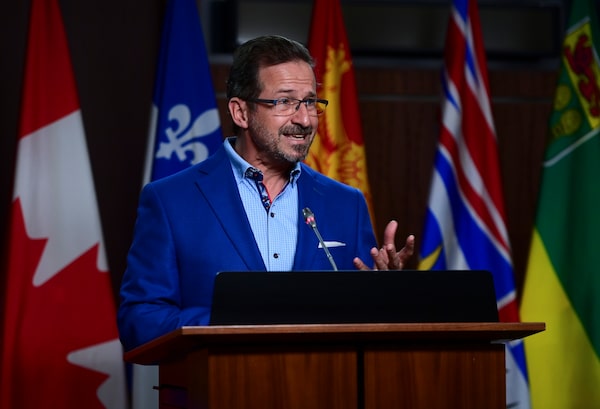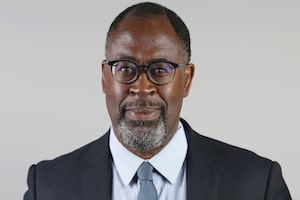
Bloc Quebecois Leader Yves-Francois Blanchet holds a news conference on Parliament Hill on May 19, 2021.Sean Kilpatrick/The Canadian Press
The leader of the Bloc Québécois says he will test Prime Minister Justin Trudeau’s “resolve” by tabling a motion in Parliament calling on all MPs to back Quebec’s legislation to bolster the use of French in that province.
Yves-François Blanchet says Mr. Trudeau’s support of the principles of Bill 96 are linked to political realities around holding onto the Liberal voters in Quebec, key to competing for seats in the province during a possible election year.
“If he had responded in a different way, he would have threatened many of his elected members in Quebec,” Mr. Blanchet told a news conference on Wednesday. “I will test [the Prime Minister’s] resolve with a motion.”
François Legault just set a constitutional trap for Justin Trudeau
Mr. Blanchet said the motion will declare Quebec can “totally and fully” proceed with amending the Constitution to enshrine Quebec’s status as a nation where the official language is French.
Other measures in the legislation include reinforcing French language requirements in the bureaucracy, government agencies and workplaces; requiring immigrants to interact with the government in French after six months in the country; and tightening rules already in place to require larger French text on commercial signs to accompany company trademarks in English.
Bloc spokesman Julien Coulombe-Bonnafous said in an interview that the caucus will reach out to the other federal parties on how to procced. He noted that the text of the motion has not yet been composed.
Asked about the motion, Conservative spokesman Josie Sabatino said in an interview that the party will review the motion once it’s tabled. In a statement, NDP spokesperson Mélanie Richer said, “We impatiently wait to see what it will contain.”
The Globe and Mail was unable to reach Montreal-area Liberal MPs, including those representing ridings with large anglophone communities, on Wednesday. Of those who responded, Liberal MPs Anju Dhillon, Justice Minister David Lametti and Sameer Zuberi declined interviews on the issue.
A statement issued by the office of Official Languages Minister Mélanie Joly said Bill 96 is still being analyzed. “The protection and promotion of French is a priority for our government. The situation of French in Canada is unique and the government has a responsibility to protect and promote French not only outside Quebec, but also within Quebec. Of course, our government will do so while it continues to protect the rights of linguistic minorities, including those of the English-speaking minority in Quebec.”
Asked about Bill 96, Indigenous Services Minister Marc Miller, a Montreal-area MP, said, at a news conference that most Canadians recognize that protecting French is key to Canada’s bilingual nature.
Mr. Miller said six or more generations of his family hail from Quebec, adding that most of his education was in French and he has raised his children in the language.
“Our job as federal representatives is to protect French [and] to protect language minorities, including English in Quebec,” he said.
But anglophone Montrealer Clifford Lincoln, a former Liberal member of the Quebec national assembly, said the new debate is an exhausting return to a perennial concern.
“The language issue in Quebec has become like water torture,” he said in an interview. “It never ends – it rears its head every several years, and as soon as there’s some sort of peace, you can be sure it’s going to start again and you wonder how far it’s going to go.”
Referring to the federal government’s response, Mr. Lincoln, now 92, said, “Already [they] seem to be giving in, according to what Trudeau said yesterday.”
In his first comments since the announcement of Quebec’s most notable language reforms in decades, Mr. Trudeau said Tuesday that the province can amend part of the Constitution to underscore that it is a nation and that its official language is French – adding that both things have already been recognized by the federal government. Leaders of the Conservatives and NDP have also been supportive.
Mr. Lincoln served as an environment minister in the 1980s under then-premier Robert Bourassa, and quit cabinet in 1989 to protest government language policy, including the use of the notwithstanding clause of the Constitution to make French the ascendant language for commercial signs.
Mr. Lincoln said he wished Mr. Trudeau had acknowledged Canada’s bilingual nature while ruling out a “bilateral deal” with Quebec that would impact the rights of the English-speaking minority in Quebec.
“What would stop Alberta or Saskatchewan or any English-speaking province from doing the same in reverse? That’s what I think his father would say.”
Editor’s note: (May 20, 2021): An earlier version of this article incorrectly identified Josie Sabatino.
Know what is happening in the halls of power with the day’s top political headlines and commentary as selected by Globe editors (subscribers only). Sign up today.
 Ian Bailey
Ian Bailey